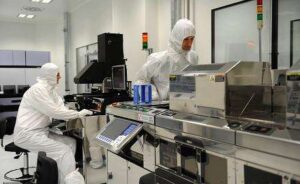Trump Chip Tariffs 2025: Apple and Nvidia Secure Key Exemptions
Exemptions for U.S.-Based Investment
At a White House event showcasing Apple’s new $100 billion U.S. investment, Trump declared: “If you’re building, there will be no charge.” The announcement confirms a de facto policy many in the industry already assumed—tariff exemptions in exchange for American capital commitments.
Apple CEO Tim Cook praised the administration’s stance, noting the company plans to manufacture 19 billion chips across 24 factories in 12 states. Apple’s updated investment includes a major initiative with Corning to produce all iPhone and Apple Watch glass in Kentucky.
Apple’s Strategy and Global Trade Risks
Apple’s pledge adds to a broader $500 billion commitment announced earlier this year. However, analysts argue that much of this figure repackages existing U.S. operations. Critics caution that while splashy, such announcements don’t always create new jobs or materially re-shore manufacturing.
Apple has strategically shifted some iPhone production to India—a country Trump just hit with a 50% tariff due to oil imports from Russia. The shift from China was meant to diversify risk, but now faces fresh trade challenges of its own.
Nvidia and the Art of Influence
Also at the White House was Nvidia CEO Jensen Huang, whose company has promised $500 billion in U.S. investment. Nvidia has emerged as one of Trump’s favorite companies, particularly after joining the president on a recent trip to the Middle East and securing a rollback of export restrictions on its AI chips for China.
Trump’s praise was effusive, calling Apple’s Cook “one of the great and most esteemed business leaders, geniuses and innovators anywhere in the world.” Just months ago, Trump had criticized Apple for offshoring iPhone production, but Wednesday’s event marked a clear shift.
Tariffs, Tech, and the “Pay-to-Play” Dynamic
Industry analysts suggest we’re entering a “pay-to-play” environment in which companies can earn favorable treatment through U.S. investment pledges. According to Craig Moffett of Moffett Nathanson, “Companies can buy their way into tariff exemptions, even if those investments fall far short of actually re-shoring manufacturing.”
That sentiment was echoed by Adam Kovacevich, CEO of the Chamber of Progress, who noted, “Every company has learned a lot about how to navigate their relationship with Trump. Nvidia and Apple are among the companies that have done it the best.”
Stock Market Reaction
Apple shares rose 5.1% during regular trading on the news, and added another 3.5% after hours. Shares of Taiwan Semiconductor and other chip companies gained over 3%, as clarity on exemptions eased investor concerns about broad supply chain disruption.
Conclusion
The Trump chip tariffs 2025 announcement formalizes what many industry leaders suspected: investment in American manufacturing is now a prerequisite for market stability. As the White House doubles down on its “Made in America” agenda, companies like Apple and Nvidia are positioning themselves to thrive under the new rules—whether or not their actual manufacturing footprints significantly change.

